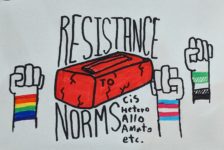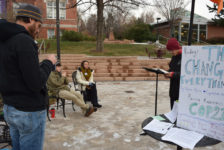
Costumes and accessories on display in the cowboys and indians section of the Spirit Halloween store in West Jordan. Denise Dennis, the manager of the West Jordan Spirit Halloween store, said she hasn’t received many complaints from customers about racialized costumes. Photo by Kamarie DeVoogd.
“My culture is not a costume.” This message was posted on fliers around campus last year, and with Halloween right around the corner, the same concerns are resurfacing for some Westminster College students.
Stephanie Miller, a senior at Westminster and the program coordinator at the college’s Diversity and Inclusion Center, said Halloween costumes bring to light problematic cultural appropriation.
“The fact that people think that you have to have the person’s skin color in order to look like them is the problem,” Miller said. “The skin isn’t the character itself. If you have a good enough costume, people will know what you’re dressing up as.”
This fall, Disney debuted kids’ costumes for its upcoming film “Moana.” Less than a week later, the company pulled several products after they sparked outrage for appearing to promote brownface, according to the Huffington Post.
The costume features a brown skin bodysuit with Polynesian tattoos and a faux-leaf skirt.
During her time at Westminster, Miller has studied racism and said she has applied her knowledge to her work in the Diversity and Inclusion Center.
“I’m not Polynesian, but I do know that typically there’s meaning to the tribal tattoos within their culture,” Miller said. “Taking it without learning about the meaning behind it is an oppressive action or behavior.”
Through some research of her own, Miller said she checked the Spirit Halloween’s online costume store to see how it categorizes its costumes.
“I found the ‘Mexican Man’ costume in the humor section between a tiger and a monkey costume,” Miller said. “They don’t dress like that, first of all, and it is dehumanizing that they are categorized with animals.”
Ivan Lezama, a junior soccer player, said he doesn’t see a problem with the ‘Mexican Man’ costume.

A “Mexican Man” costume sits on display in the Spirit Halloween store in West Jordan. Ivan Lezama, a student at Westminster, said the costume doesn’t bother him because he is proud of his Mexican culture. Photo by Kamarie DeVoogd.
“It doesn’t bother me, and I’m only speaking for myself,” Lezama said. “For me, I’m really proud of my culture and being Mexican, so if that is how Mexicans are being represented stereotypically, it makes no difference, really.”
Denise Dennis, the manager of a Spirit Halloween store located in West Jordan, said she hasn’t received many complaints from customers about racialized costumes.
“Think about why you dress up; it’s because you like the thing you’re dressing up as,” Dennis said. “I would imagine it is rare that someone wears something to be racist, but we’ve been brought up in a culture that we don’t think twice; we’re not sensitive.”
Stella Zhang, an international student from China, said she is not offended by Halloween costumes representing her culture. Even though Zhang said she would not take offense to what individuals wear, she said she would find it offensive if they taped their eyes to change the look of their face.
Miller, the program coordinator at the college’s Diversity and Inclusion Center, said it’s important for individuals to appreciate a culture before dressing up.
“I think the majority of people don’t have malicious intention, but that’s the problem,” Miller said. “If you really want to appreciate a culture, you have to learn about the significance of it and the oppression that they’re dealing with and how your action is affecting them.”
Miller also offered her advice when picking out costumes this season.
“If you worry that you are going to offend someone, then it is probably a problem,” Miller said. “You can technically wear what you want, but if you want to be a respectful person, you just shouldn’t do it.”









